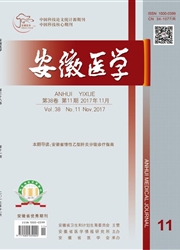

 中文摘要:
中文摘要:
目的 分析老年食管癌的临床特点及不同治疗方法的疗效,结合生存及不良反应分析来评价不同治疗方法的优劣,从中探讨适合老年食管癌患者的治疗方案。方法 回顾性分析接受单纯放射治疗或放化联合治疗的初治≥70岁老年食管鳞癌患者共143例,放疗剂量50~66Gy(中位剂量60Gy),1.8~2.0Gy/次,5~6次/周。Kaplan-Meier法计算总生存(OS)和无进展生存(PFS),Logrank法检验差异并作单因素预后分析,Cox回归模型作多因素预后分析。结果 随访率为93%,全组中位OS为18个月,中位PFS为13个月。老年组照射剂量DT≥60Gy较〈60Gy有着更好的总生存,5年OS15%vs0%(P=0.001)。中位PFS为23个月vs14个月。多因素分析,肿瘤分期、放疗剂量、有无合并症、吸烟与否是老年食管癌的预后影响因素。结论 老年食管癌同步放化疗组的OS和PFS较单纯放疗组有提高,然是否化疗非老年食管癌独立预后因素。老年食管癌接受照射剂量≥60Gy总生存及无进展生存更优于〈60Gy组。
 英文摘要:
英文摘要:
Objective With the analysis on the clinical characteristics of esophageal carcinoma of the elderly patients and outcomes of different therapies, the advantages and disadvantages of different therapies were evaluated considering survival and adverse effects of the therapies. Methods A retrospective analysis was conducted on 143 cases of elderly patients( aged 〉170 years old) with esophageal carcinoma who had received radiotherapy alone or initial treatment of combined ehemoradiotherapy. The dose of radiotherapy was 50 - 66 Gy (median dose, 60 Gy), 1.8 -2.0 Gy per fraction, 5 - 6 fractions per week. The Kaplan-Meier method was applied to calculate overall survival(OS) and progress free survival(PFS) rates, and univariate prognostic analysis was performed using the Logrank test. The Cox regression model was applied to analyze the multivariate prognosis. Results The follow-up rate was 93%. The median OS was 18 months and the median PFS was 13 months. The elderly group receiving radiotherapy dose DT ≥ 60 Gy had better OS than those receiving radiotherapy dose DT 〈 60 Dy. The five-year OS was 15% to 0 (P =0. 001 ). The Median PFS was 23 months to 14 months. The multivariate analysis was made to find out whether neoplasm staging, radiotherapy dose, the occurrence of complications and smoking was identified as factors influencing the clinical outcomes and prognosis of elderly patients with esophageal carcinoma. Conclusion The OS of the CRT group has increased compared with that of the RT group and chemotherapy is not the independent prognostic factor. Elderly patients receiving radiotherapy dose DT≥60 Gy have better OS than those receiving radiotherapy dose DT 〈 60 Dy.
 同期刊论文项目
同期刊论文项目
 同项目期刊论文
同项目期刊论文
 期刊信息
期刊信息
